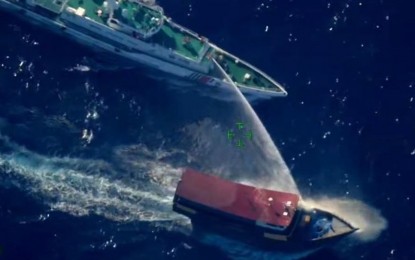
AGGRESSIVE ACTION. A Chinese Coast Guard ship blasts a Filipino resupply boat with a water cannon in Ayungin Shoal on March 5, 2024. In a forum organized by think-tank Stratbase ADR Institute and the United States Institute of Peace (USIP) on April 11, experts said the Philippines needs broader support from the international community to prevail against China's aggressive behavior in the West Philippine Sea (WPS). (Photo courtesy of AFP Facebook)
MANILA – The Philippines needs broader support from the international community to prevail against China's aggressive behavior in the West Philippine Sea (WPS).
Experts made this remark during an April 11 closed-door forum hosted by think-tank Stratbase ADR Institute and the United States Institute of Peace (USIP), according to a statement by the think-tank released on Monday.
This two-day event titled “The West Philippine Sea as Ground Zero of Emerging Risks and Opportunities” brought together incumbent and former government officials, members of the diplomatic community, scholars, and policy experts to discuss the maritime security landscape in the WPS and explore avenues for cooperation with like-minded countries.
In his presentation, former Armed Forces of the Philippines (AFP) chief Emmanuel Bautista said only 21 countries expressed support for the country when the China Coast Guard harassed and fired its water cannons against a Filipino resupply boat en route to Ayungin Shoal last March.
“We saw 21 countries support us in that incident but these are just 21 countries. There are over 100 countries around the world,” Bautista said.
None of these 21 nations were from Southeast Asia, Bautista said.
“We hope more will speak out. We hope, especially, that our brothers in Southeast Asia will also speak out,” Bautista said.
In the forum, Bautista acknowledged that there is no enforcement mechanism for the 2016 arbitral ruling that recognized the Philippines’ sovereign rights to areas within its exclusive economic zone in the WPS.
“But if all of us speak out, I mean the international community, then that will result in social pressure on any errant state,” he stressed.
Meanwhile, Stratbase ADR Institute president Dindo Manhit condemned China’s gray zone tactics which "seek to destabilize a rules-based international order."
"Our country continues to encounter such attacks in the WPS in the form of shadowing, blocking, swarming strategies, laser incidents, water cannons, and even intentional collision incidents," he added.
“I don’t see risk, I see opportunities for the Filipino nation. But it takes a whole of Philippine society approach. It takes the Philippines as a whole talking with the international community,” Manhit stressed.
As this developed, Brian Harding, USIP’s senior expert on Southeast Asia and the Pacific Islands, noted how the situation in the WPS "escalated" over the last few months but stressed that the Philippines’ position is "much stronger than it was."
“Certainly, the US-Philippines alliance has continued to build and deepen. There's much more trust and I think this trilateral relationship, it's pretty extraordinary – how this US-Japan-Philippines trilateral has come together,” he added.
Harding was referring to the historic April 12 trilateral summit where the three countries announced a stronger alliance.
Meanwhile, USIP senior program analyst Rosie Levine highlighted new developments in joint patrols, like the one conducted by the Philippines, US, Japan, and Australia this month.
“This deterrence architecture that's really meant to send the signal to China in a coordinated way that the Philippines isn't alone… This is a united approach. It’s going to be much harder to pressure any individual actor as long as that architecture is in place,” Levine said. (PNA)
